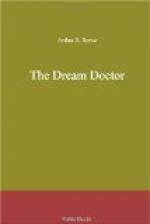“What have you done since?” asked Craig.
“I have turned loose everyone I could find available,” replied Dr. Leslie, handing over a sheaf of reports.
Kennedy glanced keenly over them as they lay spread out on the table. “I should like to see the body,” he said, at length.
It was lying in the next room, awaiting Dr. Leslie’s permission to be removed.
“At first,” explained the doctor, leading the way, “we thought it might be a case of knock-out drops, chloral, you know—or perhaps chloral and whiskey, a combination which might unite to make chloroform in the blood. But no. We have tested for everything we can think of. In fact there seems to be no trace of a drug present. It is inexplicable. If Maitland really committed suicide, he must have taken something—and as far as we can find out there is no trace of anything. As far as we have gone we have always been forced back to the original idea that it was a natural death--perhaps due to shock of some kind, or organic weakness.”
Kennedy had thoughtfully raised one of the lifeless hands and was examining it.
“Not that,” he corrected. “Even if the autopsy shows nothing, it doesn’t prove that it was a natural death. Look!”
On the back of the hand was a tiny, red, swollen mark. Dr. Leslie regarded it with pursed-up lips as though not knowing whether it was significant or not.
“The tissues seemed to be thickly infiltrated with a reddish serum and the blood-vessels congested,” he remarked slowly. “There was a frothy mucus in the bronchial tubes. The blood was liquid, dark, and didn’t clot. The fact of the matter is that the autopsical research revealed absolutely nothing but a general disorganisation of the blood-corpuscles, a most peculiar thing, but one the significance of which none of us here can fathom. If it was poison that he took or that had been given to him, it was the most subtle, intangible, elusive, that ever came to my knowledge. Why, there is absolutely no trace or clue—”
“Nor any use in looking for one in that way,” broke in Kennedy decisively. “If we are to make any progress in this case, we must look elsewhere than to an autopsy. There is no clue beyond what you have found, if I am right. And I think I am right. It was the venom of the cobra.”
“Cobra venom?” repeated the coroner, glancing up at a row of technical works.
“Yes. No, it’s no use trying to look it up. There is no way of verifying a case of cobra poisoning except by the symptoms. It is not like any other poisoning in the world.”
Dr. Leslie and I looked at each other, aghast at the thought of a poison so subtle that it defied detection.
“You think he was bitten by a snake?” I blurted out, half incredulous.
“Oh, Walter, on Broadway? No, of course not. But cobra venom has a medicinal value. It is sent here in small quantities for various medicinal purposes. Then, too, it would be easy to use it. A scratch on the hand in the passing crowd, a quick shoving of the letter into the pocket of the victim—and the murderer would probably think to go undetected.”




